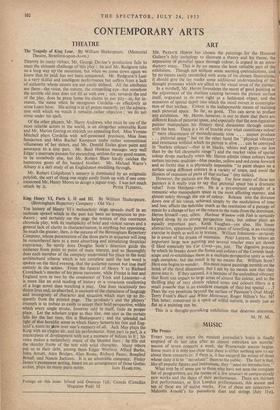CONTEMPORARY ARTS
THEATRE
The Tragedy of King Lear. By William Shakespeare. (Memorial Theatre, Stratford-upon-Avon.) • DasPrrn its many virtues, Mr. George Devine's production fails to meet the ultimate challenge of this play ; he and Mr. Redgrave take us a long way up the mountain, but when we come down again we know that its peak has not been conquered. Mr. Redgrave's Lear is a very skilful and intelligent performance but suffers from a lack of authority whose causes are not easily defined. All the attributes are there—the voice, the stature, the compelling eye—but somehow the terrible old man does not fill us with awe ; nor, towards the end of the play, does he press home his claims to our pity—in, for in- stance, the • scene when he recognises Cordelia----as effectively as some Lears have. His acting is at all points masterly, yet the admira- tion with which we watch it remains rather objective ; we do not come under his spell.
Of the other players, Mr. Harry Andrews, who must be one of the most reliable actors in the world, is an altogether admirable Kent and Mr. Marius Goring an eldritch yet appealing fool. Miss Yvonne Mitchell plays Cordelia with self-possessed precision, Miss Joan Sanderson and Miss Rachel Kempson make rather conventional villainesses of her sisters, and Mr. Donald Eccles gives point and assurance to a tiny part. Mr. Basil Hoskins manages very well Edgar's insensate passion for pretending, seldom for any good reason, to be somebody else, but Mr. Robert Shaw hardly catches the humorous gusto of his bastard brother. Mr. Michael Warre's Albany is a deft study of an Englishman muddling through.
Mr. Robert Colquhoun's scenery is dominated by an enigmatic polylith, the sort of thing one might easily finish up with if one com- missioned Mr. Henry Moore to design a jaguar-trap. I was not much


























 Previous page
Previous page